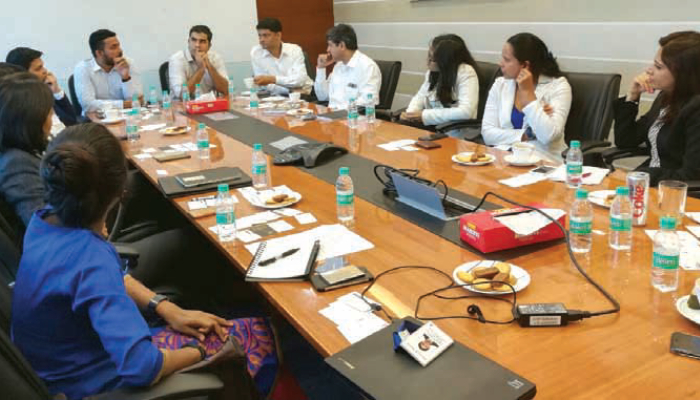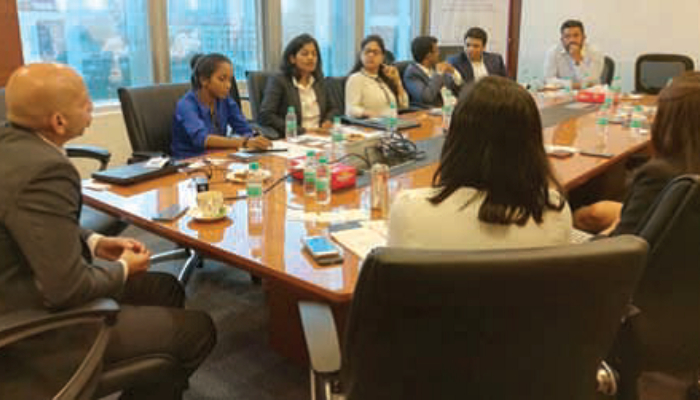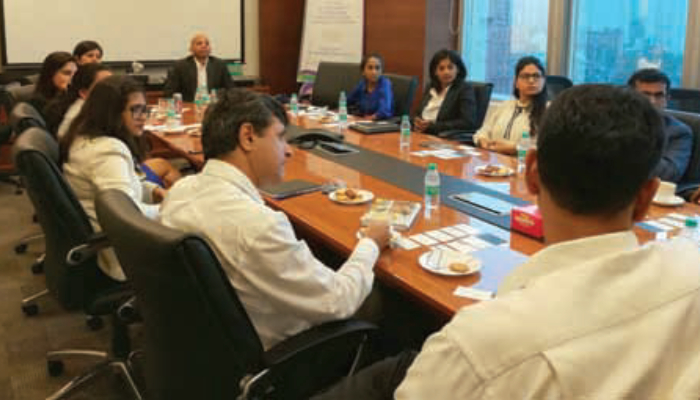
or

The India network of the International Women’s Insolvency & Restructuring Confederation (IWIRC) hosted its first event in Mumbai on 20th July 2017. The event was an invitation-only roundtable table discussion on “Restructuring Plans under the new IBCScope, Opportunities and Challenges” and was attended by a cross-section of senior representatives from across the restructuring and insolvency industry in India- participating organisations included Aion Capital, Altico, Transcon Capital, JMF ARC, Phoenix ARC, Ambit Flowers ARC, ICICI bank, Alvarez & Marsal, Trilegal, Dhir & Dhir Associates and GLS Law.
The event was supported by Alvarez & Marsal who hosted the event at their offices. Mr. Nikhil Shah, Managing Director, Alvarez & Marshal delivered the opening address at the event.
The event was organised by several current/former board members of IWIRC India and IWIRC Singapore Ms. Upasana Rao and Ms. Kosturi Ghosh (Trilegal), Ms. Riddhi Dalal (JMF ARC), Ms. Khushboo Vaish and Ms. Kayva Ramanathan (Alvarez & Marsal) and Ms. Pooja Sinha (GLS Law, Singapore).

The participants engaged in an interactive and lively discussion on the topic- key discussion points included whether the RBI would continue to flex its regulatory muscle going forward (as it had done under its directive dated 13 June 2017 to banks to pursue debt restructuring proceedings in respect of 12 companies), the role of promoters in debt restructurings and the practical issues involved in achieving “turnarounds” of companies and opportunities and challenges in relation to distressed debt M&A and for providers of interim financing. The IWIRC India network has made available the full list of takeaways from the roundtable discussion on its Facebook and Linkedin pages.

This is the first of many thought leadership events on the IBC that the IWIRC India network intends to organise as part of its focus on becoming a recognised industry forum in the restructuring and insolvency sector for both men and women in India. IWIRC India will also be a key participant in the first ever IWIRC PacRim Regional Conference being hosted by IWIRC Singapore on 23 August 2017.
On June 13, 2017, the RBI (India’s central bank) directed bank lenders to pursue restructuring proceedings under the IBC against 12 companies which represent a quarter of India’s estimated US$120 billion bad loan problem. The general view is that the RBI will continue to flex its regulatory muscle in a similar way going forward to press ahead with bad loan resolution. The Gujarat High Court has dismissed the plea from one of the identified companies against the RBI claiming its lack of authority to issue such a directive.
One of the challenges under the other restructuring forums (such as the JLF- a non-statutory forum for enabling debt workouts available to domestic Indian banks) is the fact that stakeholders are often unable to reach consensus on the terms of a debt workout. While one of the benefits of the IBC is the strict timelines that it imposes, it remains to be seen whether the multiple stakeholders involved in the cases initiated pursuant to the RBI directive will in fact be able to reach a consensus in the 180+90 day timeframe under the IBC and given the absence of separate voting rights for secured and unsecured creditors. The cram-down mechanism in the IBC is a helpful tool in this regard- financial creditors who reject the restructuring plan are only entitled to get the liquidation value.
The NCLT is estimated to have heard 100+ cases so far and the general trend has been to further the IBC’s creditor-friendly spirit. However, the precedent on a number of law and practice points is yet to be settled and therefore the flood of cases that is expected further to the RBI directive will be keenly watched. Some of the key open issues at present are: (i) how claim verification will work in practice given the electronic database of debt details (the information utility) is yet to be set up; and (ii) the extent to which a lender’s contractual rights to interest/default interest will be recognized.
It is widely agreed that there will be a large number of cases brought under the IBC going forward including several midmarket companies in addition to the 12 high-profile 12 companies covered by the RBI directive. While we have seen a large number of resolution professionals (RPs) registered under the IBC, it remains to be seen whether such professionals have adequate experience and bandwidth particularly given this is a new industry in India. Unlike Singapore, there is no ongoing court supervision of the restructuring process as such and significant powers are given to the RPs. It will be important to address the liability concerns of such individuals and the availability of D&O style insurance will be a helpful development in this regard.
One of the main challenges in a workout situation is achieving effective “turnaround”– it is generally recommended for lenders and promoters to bring in professional advisers for this.
From a practical perspective, any turnaround effort requires buy-in from the debtors’ promoters to be effective. Generally, it is expected that during the moratorium the business will run in the ordinary course and the promoters will cooperate with the RPs for this purpose. The RP can also procure a change in the management of the company. While the IBC allows RPs to approach the NCLTs if promoters don’t in fact co-operate, these provisions are untested as of date. Recently, the NCLT also held that no moratorium would apply with respect to the right of the banks to enforce against the personal property of a promoter unlike the moratorium in respect of enforcement against the debtors’ assets that comes into effect once a resolution process commences.
Fresh capital infusion in debt restructurings is the need of the hour for viable companies. There are a number of domestic and international players who are evaluating opportunities to extend financing in a distress scenario particularly given that the IBC specifically contemplates that rescue financing will have priority in a liquidation scenario. However, it is currently unclear how such priority would work in practice in a pre-liquidation scenario and if consents from existing lenders will be needed. The IBC effectively empowers the RP to raise interim finance in the debtor company – this is in contrast to the new rescue financing regime in Singapore where such financings are monitored by the court.
Another challenge for distressed debt financiers is identifying the “viable” companies. A thorough diligence (Operational, Financial and Legal) is important particularly if there is information asymmetry – specialist experience of conducting due diligence in a distressed debt situation is helpful in this regard.
The current landscape will lead to an increase in distressed asset M&A particularly with the debt-equity conversion in favour of bank lenders under the SDR route further enabling strategic sales. However, changes to other Indian regulations haven’t moved in tandem particularly for listed companies creating uncertainty – for example, while the Takeover Code incorporates exemptions from the open offer requirements for debtequity conversions under the SDR route, there is no such exemption for non-SDR acquisitions or from other statutory approvals such as antitrust approvals.
International distressed debt investors without a presence in India are somewhat limited in the investment structures they can use for any priority financing given the RBI restrictions on foreign lending and on instruments with upside features (although these have been significantly liberalised in recent years). However, such investors could explore co-investments with domestic players. At present, there is some flexibility to issue structured debt products to international investors under the NCD route. One key benefit under the IBC for international investors is that unlike other restructuring forums in India, they are at par with domestic creditors under the IBC although to have an effective vote in the IBC process, they will need to achieve consensus among holders of at least 75% of the aggregate debt or hold at least 26% of the aggregate debt to block a plan from the majority creditors.
IWIRC India will be a key participant in the 1st IWIRC PacRim Restructuring and Insolvency Conference to be held in Singapore on Wednesday, 23rd August, 2017.
International Women’s Insolvency & Restructuring Confederation (“IWIRC”) is committed to the connection, promotion and growth of women in insolvency and restructuring professions worldwide. The organisation provides its members with relationship-building, educational, career enhancement and promotional opportunities. Several of our events are open to both men and women. For more information, visit us at www.iwirc.com. The IWIRC India Board for 2017 comprises Ms. Maneesha Dhir, Ms. Poonam Rawat, Ms. Mamta Binani, Ms. Kosturi Ghosh, Ms. Upasana Rao, Ms. Riddhi Dalal and Ms. Kavya Ramanathan. For further details, please contact: Poonam Rawat Board Member – IWIRC India M: +91-99106 21935 E: [email protected] D-55, Defence Colony, New Delhi – 110024, INDIA
The LW Bureau is a seasoned mix of legal correspondents, authors and analysts who bring together a very well researched set of articles for your mighty readership. These articles are not necessarily the views of the Bureau itself but prove to be thought provoking and lead to discussions amongst all of us. Have an interesting read through.

Lex Witness Bureau

Lex Witness Bureau

For over 10 years, since its inception in 2009 as a monthly, Lex Witness has become India’s most credible platform for the legal luminaries to opine, comment and share their views. more...
Connect Us:


The Grand Masters - A Corporate Counsel Legal Best Practices Summit Series
www.grandmasters.in | 8 Years & Counting
The Real Estate & Construction Legal Summit
www.rcls.in | 8 Years & Counting
The Information Technology Legal Summit
www.itlegalsummit.com | 8 Years & Counting
The Banking & Finance Legal Summit
www.bfls.in | 8 Years & Counting
The Media, Advertising and Entertainment Legal Summit
www.maels.in | 8 Years & Counting
The Pharma Legal & Compliance Summit
www.plcs.co.in | 8 Years & Counting
We at Lex Witness strategically assist firms in reaching out to the relevant audience sets through various knowledge sharing initiatives. Here are some more info decks for you to know us better.
Copyright © 2020 Lex Witness - India's 1st Magazine on Legal & Corporate Affairs Rights of Admission Reserved